#Croatian Army
Explore tagged Tumblr posts
Text

Croatian Army Soldier during a military advisory team training exercise at the Joint Multinational Readiness Center in Hohenfels, Germany.
The U.S. Army photo by Spc. Tristan Bolden (2012)
3 notes
·
View notes
Text
Historical Armies - Army of King Tomislav
Baptized Croatia musters as many as 60 thousand horse and 100 thousand foot, and galleys up to 80 and cutters up to 100. The galleys carry 40 men each, the cutters 20 each and smaller cutters 10 each. This great power and multitude of men Croatia possessed until the time of Prince Krasimer. But when he was dead and his son Miroslav, after ruling for four years, was made away with by the ban…
0 notes
Text
Historical Armies - Army of King Tomislav
Baptized Croatia musters as many as 60 thousand horse and 100 thousand foot, and galleys up to 80 and cutters up to 100. The galleys carry 40 men each, the cutters 20 each and smaller cutters 10 each. This great power and multitude of men Croatia possessed until the time of Prince Krasimer. But when he was dead and his son Miroslav, after ruling for four years, was made away with by the ban…
1 note
·
View note
Text
My little sister got into ultrakill recently and when I asked her who's her fav so far she said Miljenko...
???
Who the fuck is Miljenko? I do not know. She points to the screen and its fucking florp
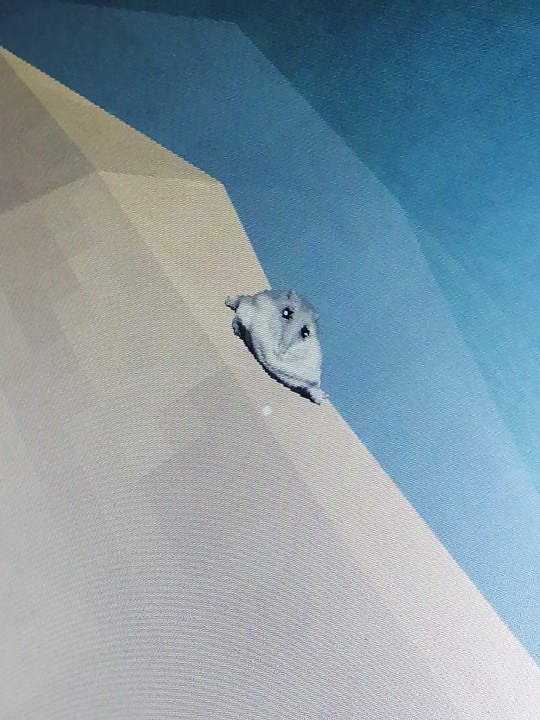
#ultrakill#v1 ultrakill#ultrakill gabriel#the fucking hamster from 5-2 it doesnt have its own tag#hampter#miljenko is a croatian name btw#sjes in love with it#i let her fuck around in sandbox and when i came back there was an army of Miljenkos#she made me fight two v2s and threatened me if i dare lay a finger on her army while fighting
95 notes
·
View notes
Text
i don't understand complaining about being drafted because you can just choose not to go anf go to jail for a whiel. think about it if you're not in jail you're not on the front getting shot at in the mud.
#literally if RH ever does a draft I'll just go yeah but consider the following : i don't wanna#I'll never fight for this country lol you won't catch me in the croatian army that's for sure
10 notes
·
View notes
Text
youtube
#youtube#militarytraining#Polish military#Military technology#Military tactics#Military training#Army training#Military firepower#Croatian military#Target practice#Live fire exercise#Weapons training#Military drills#Military operation#Military combat#Military capabilities#Military exercise#Defense training#Military demonstration#Military forces#Combat training#Military exercises#Polish army#Military comparison#Firepower#Weaponry#Artillery exercise#Army artillery
2 notes
·
View notes
Text
Kako riješiti manjak ročnika u HV – Suverenistička TV Karola Jurišića (742.emisija)
0 notes
Text
Heres the rest:
*all following pictures are from the croatian history magazine "History.info", enjoy :D*



Hello hello
So, I have been thinking....there is pretty much NO information about the Iliriyan provinces online....it is extremely hard to come by
That lead me to compile as many pictures as I could with the resources I had on hand, before I start some pictures might be bad quality becouse I took them on my phone with bad lighting...sorry 😅
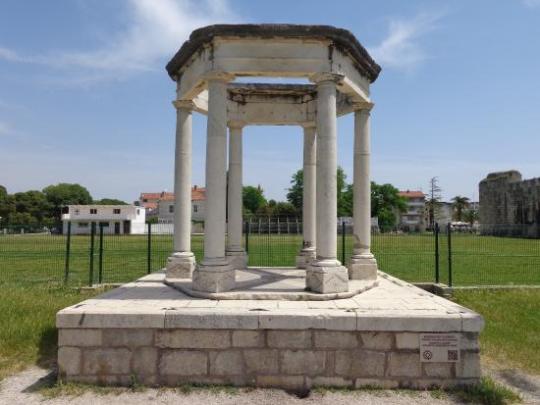
A monument built in 1808 to honor Marmont, Trogir- Croatia
It's whole purpose was just to look pretty
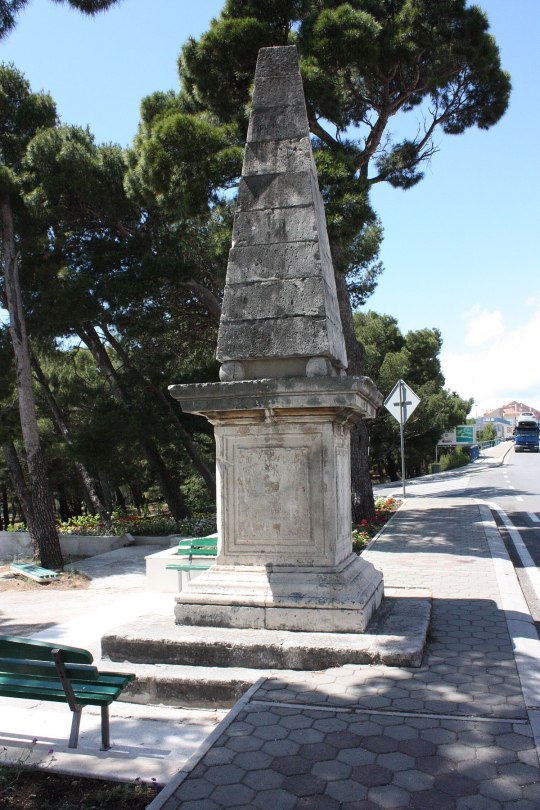
The Napoleon monument in Makraska
It has nothing to do with Napoleon, it was built to honor Marmont
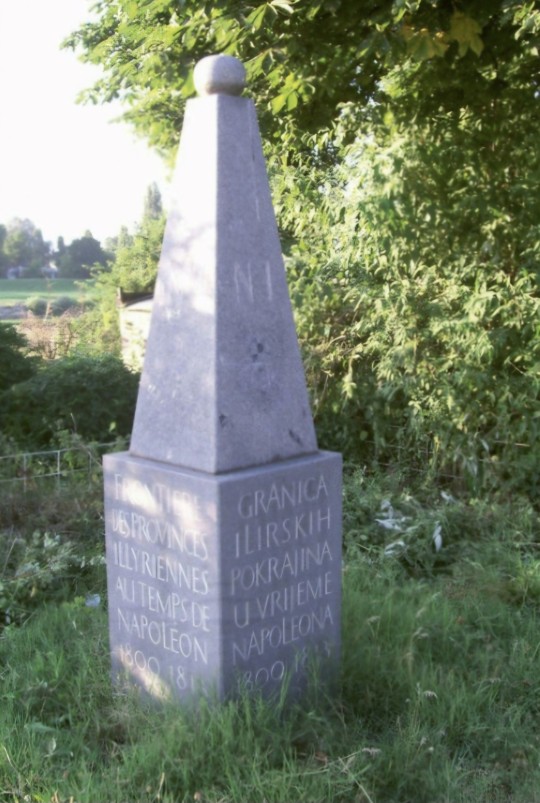
Border stone for the Iliriyan provinces, Zagreb-Croatia
It marked the border between the french and austrian sides
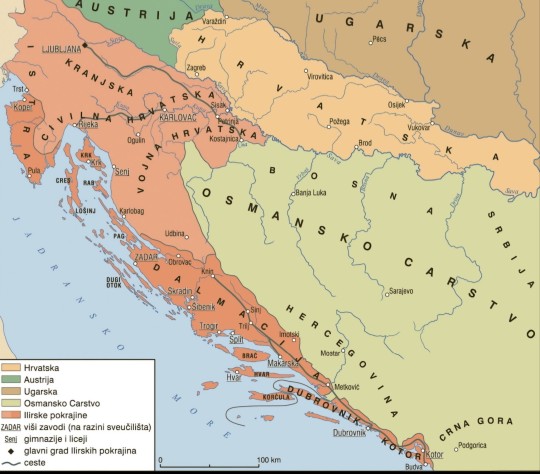
Map of the Iliriyan provinces
Orange marks the provinces,light green the ottoman empire,dark green Austria,light orange Croatia and the brown is Hungary (Ugarska/Vugarska)
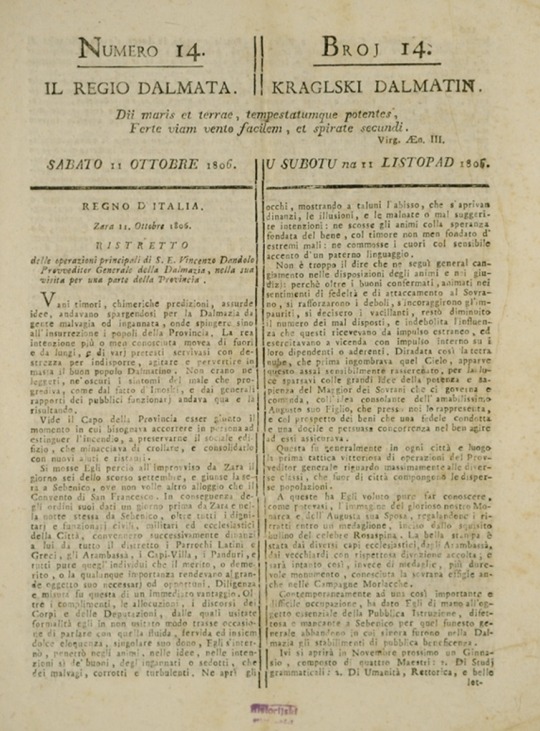
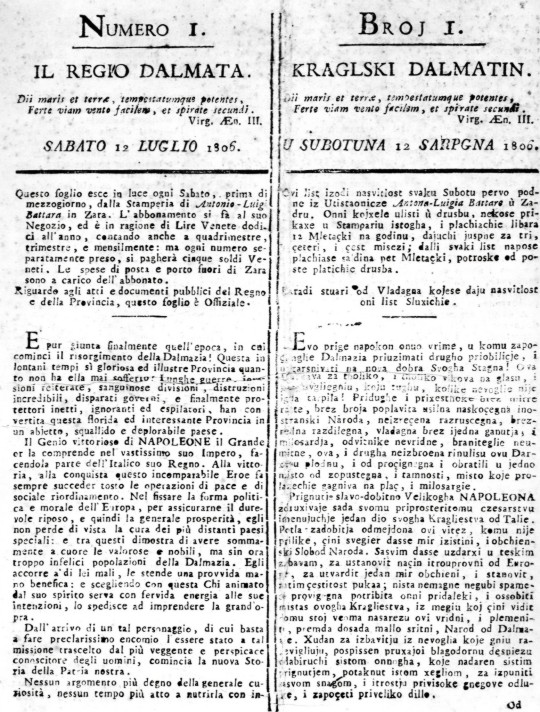
Pages of the Kraglski dalmatin/Royal dalmatian
Aka the first ever croatian news paper in both italian and croatian, which was print by the french
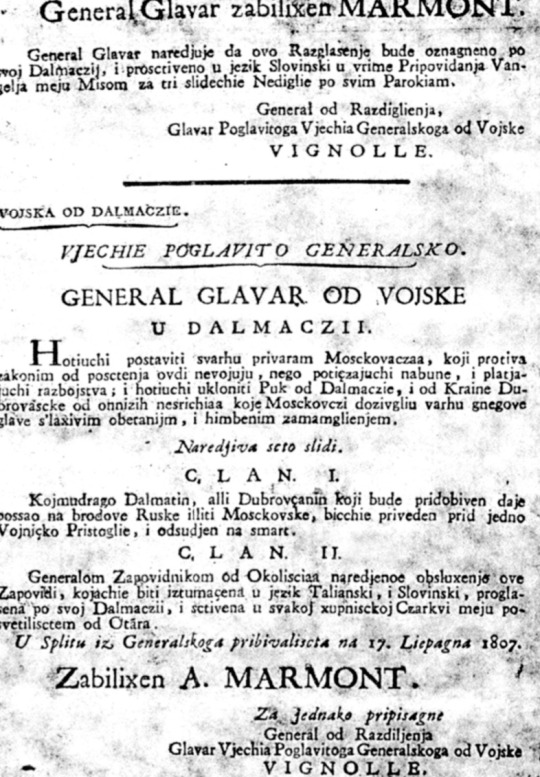
A law signed by Marmont preventing the arrival of Russian boats in iliran docks
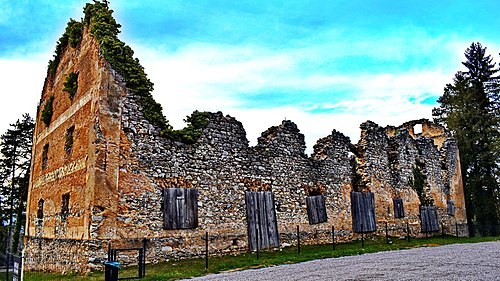
French wear house in Slunj, Croatia
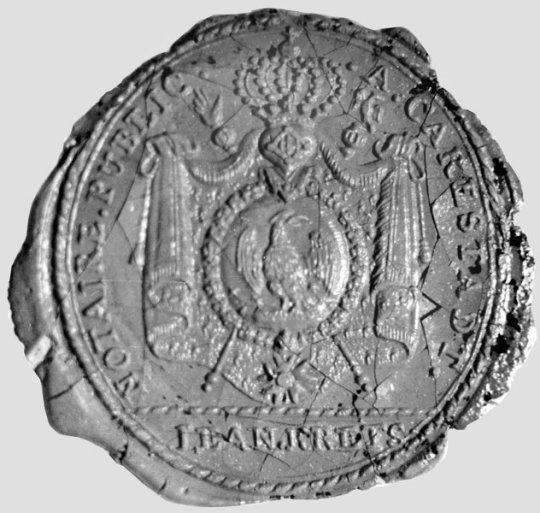
Clerks seal, around 1809 from the city of Karlovac in Croatia
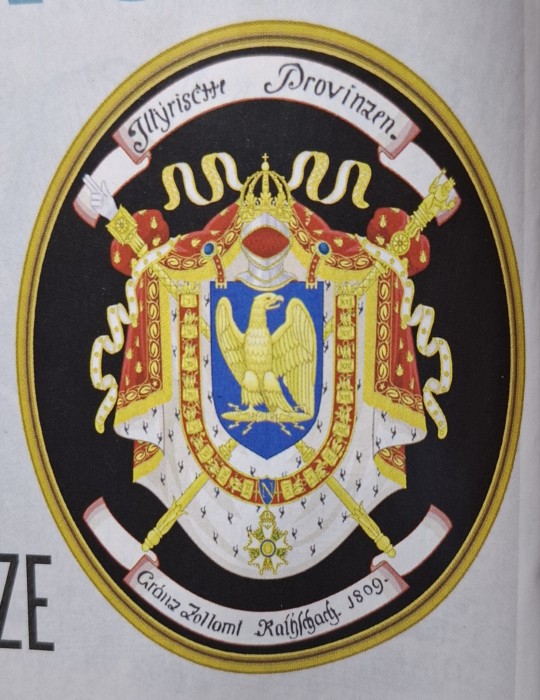
Ilirian coat of arms,1809
Next post will be the uniforms!
#napoleonic wars#history#croatian history#croatia history#auguste de marmont#auguste marmont#Iliriyan provinces#ilirian provinces#geography#historical documents#drawing refrence#marmont#napoleon#millitry history#napoleonic uniforms#ilirian uniforms#napoleons army#marmonts army#slay#fourth one from the left (first row) is my favorite btw
47 notes
·
View notes
Text
The Yugoslav volunteers in the International Brigades
Translated from this article, my own comments in [italicized brackets]
The total number of Yugoslavs in Spain differs according to researchers. The French historian, Hervé Lemesle, states that the total exceeds 1900, with the main contingent being Croatian, followed by Slovenes and Serbs. A majority were workers from many sectors and peasants. There were also doctors, engineers, teachers, journalists, and students. Most traveled from Yugoslavia, although there were groups of exileds or migrants from many European countries, as well as the US, Canada or Argentina.
The number of deaths (including MIA) in Spain is close to 800, a very high percentage (40%), although other studies estimate 32%. At any rate, it’s higher than the average losses for the International Brigades (27%). The most notorious victim was Blagoje Parović [Šmit, nom de guerre], part of the Communist Party of Yugoslavia’s Central Committee and political commissar of the XIII International Brigade, who died the first day in the Battle of Brunete. His remains were buried in the Fuencarral cemetery.
There were 16 Yugoslav women in the Health Services. The oldest was 43, while the youngest were only 22 years old. Most of the female volunteers arrived in Spain in 1937, from the Kingdom of Yugoslavia or countries such as Algeria, Belgium, Czechoslovakia, France, and Uruguay. Some of those women had been active agents of the worker movement or even members of the CPY before leaving for Spain. Those who lacked medical training attended a preparation course beforehand. They worked in the hospitals of Murcia, Albacete, Benicasim, Denia, Madrigeras, Vic, and other cities. Avgust Lesnik writes: “There were 16 women: doctors Adela Bohunicki, Nada Dimitrijević-Ne��ković, and Dobrila Mezić-Šiljak, [as well as the nurses] Ana-Marija Basch (Baš), Olga Dragić-Belović (Milić Milica), Elizabeta-Liza Gavrić, Marija-Peči Glavaš, Marija Habulin, Lea Kraus, Tereza Kučera, Lujza Pihler (Demić Borka), Ottilia Reschitz-Zanoni, Ana Seles-Brozović, Kornelija Sende-Popović, Eugenia Simonetti, and Marija Šneeman”.

Borka Demic (right) in the Pasionaria Hospital of Murcia (colored by Tina Paterson)
If I were to be born again, I’d continue fighting for the ideals of my youth. Then, nothing was difficult and I don’t regret anything (Borka Demic)
The Yugoslav volunteers in the various units and arms
After the formation of the International Brigades, the Yugoslav volunteers were distributed throughout different units. For instance, the Edgar André battalion had 36, the Thälmann had 93, Garibaldi had 40, and Chapaiev had 78. The main body of Yugoslavs, however, were first integrated into the Balkan company of the Dombrowski battalion (120), and immediately after, into the Dimitrov battalion. By early 1938 a good portion of the Yugoslavs were integrated into two of the 129th Brigade’s battalions: Dimitrov (191) and Djaković (150). They were also a part of the 45th International Division (108)
There was Yugoslav presence in various arms and services: 4 in aviation; 12 in transport units, 1 in the navy, 33 in the International Brigades’ health service, and 26 in the guerrilla groups (one of the most experienced of which was Ljubomir Ilič). More important than this was their presence (131 members) in the artillery arm, of which there were 21 in the heavy artillery Slav Group, 22 in the 2nd heavy artillery Škoda Group’s Liebknecht Battery, 18 in the 3rd heavy artillery Group, 38 in the 4th anti-tank Group’s Stjepan Radić battery, 6 in the 35 Division’s Ana Pauker artillery Group, 5 in the 45 Division’s Rosa Luxembourg artillery Group, and 21 in the Gottwald battery. Furthermore, 65 Yugoslavs fought in the Spanish units of the Republican Army. (Avgust Lesnik)
They fought in almost every front in Spain, from the defense of Madrid to the very last battles of the retreat into France (Januray-February 1939) being an example of fearlessness and courage, because of which a good part of them received war medals from the Spanish Republican Government.
The Dimitrov battalion until December 1937
As has been explained in another article, the Dimitrov battalion was formed in January 1937 in the instructional base in Mahora. They entered battle the 12th of February in the Jarama battle, which finished the 27th of that same month. Then, until mid June, it stayed covering that from with the other battalions of the XV International Brigade.

After a two week rest in Ambite (Tajuña valley), the XV Brigade travelled to Madrid’s north to take part of the first great republican offensive in Brunete. Combat started during the night of the 5 to the 6th of July. The XV International Brigade was a part of, along the XIII and 16 BM, the XV Division under general Gal’s command [János Gálicz, a Soviet-Hungarian officer who also led the Lincoln Battalion]. The mission was to take the heights of Romanillos (XIII IB) and Mosquito (XV IB). It wasn’t possible because operations were slow and the brigades could not take the important francoist positions. The Dimitrov went as far as taking the Miraval Olive Grove, but in the 18th of July, when the first francoist counter-offensive commences, they lost it. Since that point, the republican positions began to retreat until the 22nd, when they were forced to cross back through the Guadarrama river. The XV IB was relieved the 26th of July and went back to where they began the offensive.
In late July, the Dimitrov returned to Ambite (Tajuña valley) and was able to reorganize: the battalion, that had arrived with 143 combatants, reached 563. In this way, in the 24th of August, it threw itself with renewed force against the Aragonian village of Quinto, which fell 26th. During the taking of the village and the Purburell hill, which defended them to the east, the Dimitrov battalion’s courage stood out. The same was true in the fierce week-long combat to subdue Belchite.
After this battle, the Dimitrov was detached from the XV Brigade and, during the few following months, was a part of, along with the Djuro Djakovic battalion, the 45th International Division’s Reserve Group. It was a period that they dedicated to military education and to the surveillance of the Huesca Front from the second line. In January 1938 they received the order to transfer to the Southern Front. Close to Almadén, in Chillón, the last International Brigade was formed, the 129th; composed of these two battalions plus the newly created Masaryk battalion.
The Djuro Djakovic Battalion
Composed primarily of Yugoslav volunteers, plus a few Czechoslovaks and Bulgarians, adopted their name in memory of that Croat revolutionary and member of the CPY, tortured and executed in 1929 by order of the king and dictator Alexander the First.
It was formed in April 1937 from the Balkan Company of the Dombrowski battalion. This Company had participated, with the Dombrowski, in the Defense of Madrid and in the battles of Boadilla, Jarama, and Guadalajara. Its excellent conduct pushed general Lukács [Béla Frankl, or Máté Zalka, nom de guerre Pál Lukács, a Hungarian veteran of the Russian Civil War, where he fought alongside the Bolsheviks, he died 2 months later in Huesca], leader of the XII IB, to convert the Company into the core from which the new Djure Djakovic battalion would arise. Its first combat happened in April 1937 in Santa Quiteria, in the Aragon Front, along the Rakosi battalion and the Karl Marx Division.
It returned to Carabaña (Madrid) to reorganize under the command of Bulgarian captain Jristov, and marched to Roquetes in June (close to Tortosa) to join the 150th IB (Dombrowski Brigade), formed in May from the Dombrowski, Rakosi, and André Marty battalions. This brigade plus the XII IB formed the 45th division, under the command of General Kléber [Manfred Stern, nom de guerre Emilio Kléber, a Ukranian Jew member of Soviet military intelligence], was sent to Madrid in early July to take part in the Brunete offensive as a reserve unit to the XVIII Army Corps.
The Djakovic battalion did not have any special role in Brunete, but it did in the following offensive towards Zaragoza (24th of August - 7th of September), as was expressed in Wladimir Stopczyk’s final report as Commissar of the XIII IB: “It has been told to me how, when they had been encircled and cut off there was no panic whatsoever, nor any case of disobeying an order. They conducted themselves with an equal parts spirit of sacrifice and discipline, as they continue to do so, as well as the soldiers of our Brigade’s other battalions. I have to specially remark the Djakovic battalion’s attitude who, despite the heavy losses suffered in the last scuttles, with intense fire from fascist artillery and aviation, maintained a dignified and heroic attitude”.
Both in this instance as in the October attack against Fuentes de Ebro, this battalion suffered many losses. Afterwards, the Dimitrov and Djakovic battalions were designated as the 45th Division’s Reserve Group. This division, from October 1937 to January 1938, remained in the Litera region as reinforcement of the first line at the Huesca front.
The 129th International Brigade
In February 1938, these two battalions, with the predominantly Czechoslovak Masaryk battalion, formed the 129th IB, in Chillón, close to Almadén. It was led by the Polish Wacław Komar [born Mendel Kossoj, known in Spain as Wacek Komar, a Jewish survivor of the Holocaust and member of the Polish Communist Party until his retirement in 1967]. In addition to these battalions, the 129th IB had at its disposal an anti-tank battery made up of Yugoslavs, a mortar company and a cavalry squadron. In late March 1938. the 129th IB was transferred to the area around Morella, where it suffered heavy losses. The fascist troops led by general Aranda and the Italian Divisions advanced with numerous human and material resources, and the three battalions suffered severe losses. To this, the errors of the Republican command must be added, despite which the volunteers fought with high valor. Finally, in the 4th of April, the 129th evacuated the fort of Morella and retreated to rebuild its forces in Benassal, northeast of Castellón.

Yugoslav volunteers of the Djakovic battalion during the strategic retreat in Teruel
Once rebuilt and rearmed (the brigade once surpassed 2000 members), it initiated a series of defensive combats in the 17th of April in the province of Teruel in the context of the battle of the Levant. The scarcely-known feat began in Ejulve, in the province of Teruel’s north. For three months, these volunteers had the leading role in a strategic retreat of 225km [139.8 miles], through the mountains of Teruel, which brought them up to the Javalambre front, passing through Mora de Rubielos. In this last front, the 129th IB kept the defense and carried out a few attacks, highlighting the 18th of September attack to take the road from Teruel to Sagunto, the last swan song of a brigade that covered itself in glory during its short 7 month lifespan.
The Yugoslav volunteers at the end of the war in Spain
The international volunteers were disbanded in the 24th of September. In the center-south area it was done 2 weeks after, in early October. Those who remained in the Catalan region were concentrated in Campdevanol, north of Ripoll. A good part of the Yugoslavs, presents in the 129th IB and the artillery units, were concentrated in the Admiral’s headquarters in Valencia. In December, they were transported to Almusafes until they were able to travel to Barcelona by boat the 20th of January.
Days later, before Barcelona’s fall and the coming republican collapse, most of the Yugoslavs offered themselves as volunteers to help in the task of preventing the fascist advance, which they did from the 26th of January until February 6th. This is how Svetsilav Dorevic told it: “The end of our fight has come, the internationals’ last compromise was to help the Spanish fellows to contain the enemy at least a little bit, so the evacuation that had to be done could be done without panic and in order, so it did not fall prey to the enemy, as well as to prevent the capture of people at risk of death”.
After, came the concentration camps in Argeles sur Mer, Saint Cyprien, Collioure, Gurs, and others. Many managed to escape, others were transferred to the French work camps, others to the French resistance, as well as the resistance in other European countries. The metallurgical worker Koturović (“Cot”), of Belgrade, was a legendary hero of the French Resistance Movement, in which Ljubomir Ilič, Vlajko Begović, and Lazar Latinović also played a marked role.
Almost 350 were able to return to Yugoslavia, of which 250 joined the partisan fight beared by Tito [Another international volunteer] and the CPY. Around 150 perished in the national liberation war from 1942 to 1945. Many of those organized insurrections, led guerrilla detachments, or were unit chiefs. Because of their merits in the fight against the fascist invaders, the Popular Hero of Yugoslavia medal was awarded to more than 50 ex-combatants of the International Brigades, amongst which were Franc Rozman, Koča Popović, Kosta Nadj, Vladimir Popović, Peko Dapčević, Iván Rukavina, Danilo Lekić, Dušan Kveder, Veljko Kovačević, Srećko Manola, Vlado Cetković, Vojo Todorović, Otmar Kreačić, and Vicko Antić. All the rest were awarded with high medals.
#brigades#this was a challenging but enjoyable translation#I'm disappointed I was unable to find more info about some of the officials mentioned
53 notes
·
View notes
Text

Nasta Rojc - Self Portrait with a Rifle (1912)
Nasta Rojc, one of the first academically educated female painters in Croatia, was born in 1883 into a wealthy family. Her father was Croatian politician Milan Rojc, a former Minister of Education. From a young age she didn’t fit the stereotype of a young girl so, after many quarrels with her family, she persuaded them to let her peruse her true calling – painting. She was mentored by the prominent Croatian painter Oton Iveković thanks to whom she became skillful enough to continue educating herself in Vienna and Munich, alongside some of the most exquisite artists like Miroslav Kraljević and Josip Račić. She excelled at portraits and landscapes, but although she was often present in various galleries, her work was frequently overlooked. In order to obtain a better status in society her family talked her into an arranged marriage with her friend, a colleague painter, Branko Šenoa. Their marriage was based on friendship – there was neither romance nor intimacy. Nevertheless, Nasta stayed legally married to Branko until his death in 1939, even after she met her one true love.
Because of her poor health, Nasta took a trip to England, just after the end of World War I. Through one encounter she managed to heal her physical and emotional health. She met Alexandrina Maria Onslow, an officer of the British army, famous for her bravery on the war field that brought her medals of honor. Alexandrine was an exceptional woman, famous for testing the boundaries of femininity, thus opening Nasta up to her true nature. Nasta and Alexandrine traveled throughout England and Scotland getting to know one another and becoming deeply infatuated with one another; luckily, this love and infatuation lasted a lifetime and beyond. On that trip, Nasta painted the first painting of an automobile in Croatian art history, making a precedent once again, merely by her extravagantly bold life choices for that time. The two lovers returned to Zagreb together and started living together in a house that Nasta designed herself, along with a well-known architect Hugo Ehrlich, in a famous area of Zagreb, Rocco’s park.
Unfortunately, not everything went smoothly for the couple. Nasta and Alexandrine supported the partisans and after the proclamation of the Independent State of Croatia in 1941 their home was confiscated and though both of them were ill (at that time age 60 and 75), they were arrested, but soon released on account of insufficient proof. The stress was unbearable for Alexandrine, who started to fall ill more frequently, until she eventually died in 1949, leaving devastated Nasta alone. Nasta spent most of her time in the rose garden, reminiscing of her departed partner, allegedly barely painting. She died forgotten and poor on November 6, 1964, on the date of her birth. She was buried next to her beloved Alexandrine Onslow on the Mirogoj cemetery. (source)
544 notes
·
View notes
Text
Hey gang! I hate the colors on this one (I literally NEVER use colors so… yeah, those are privy to change), but here is part 1 of my (more thorough) Trellis redesign!
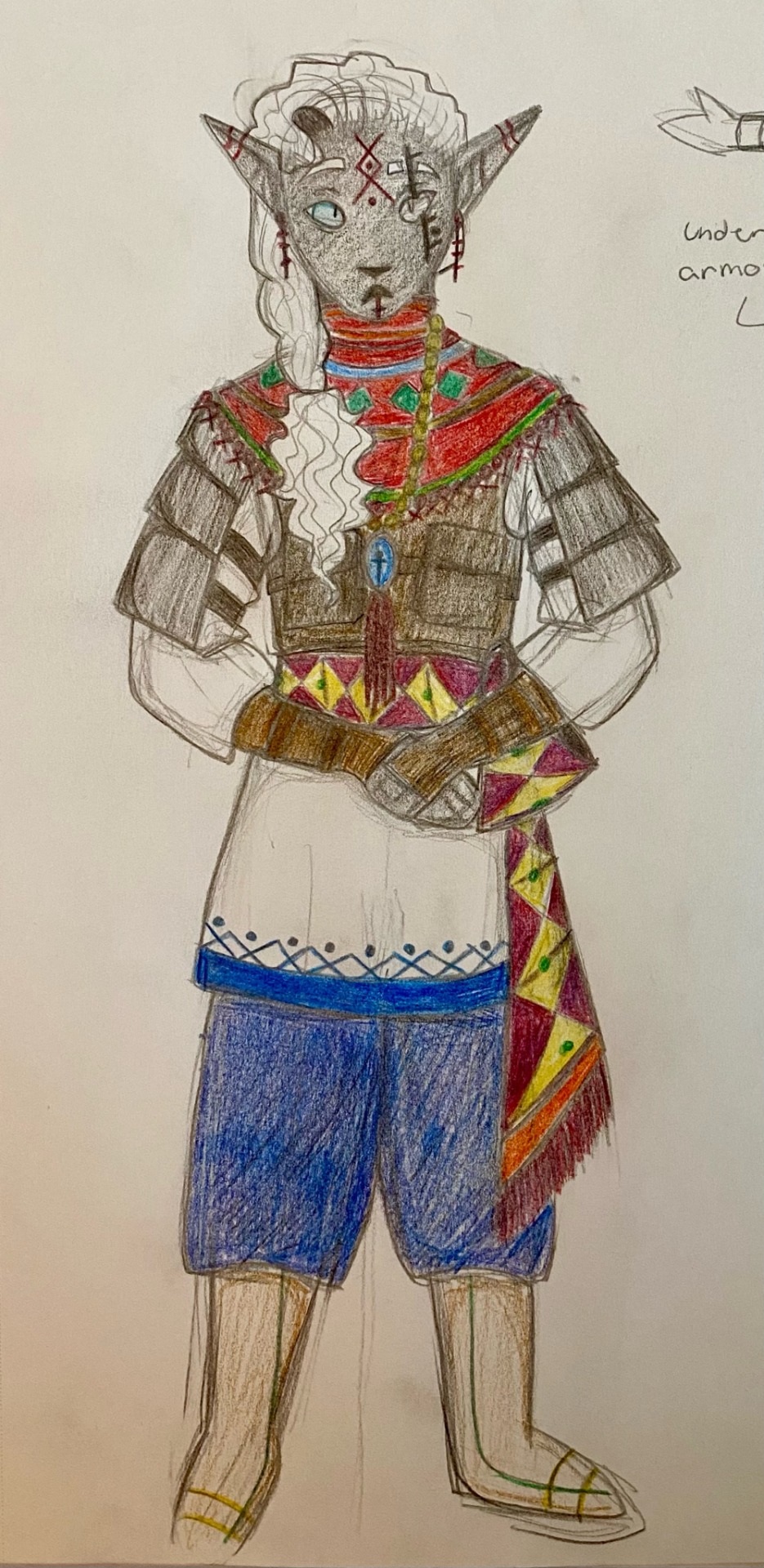
(I warned you, the colors are an eyesore 😭)
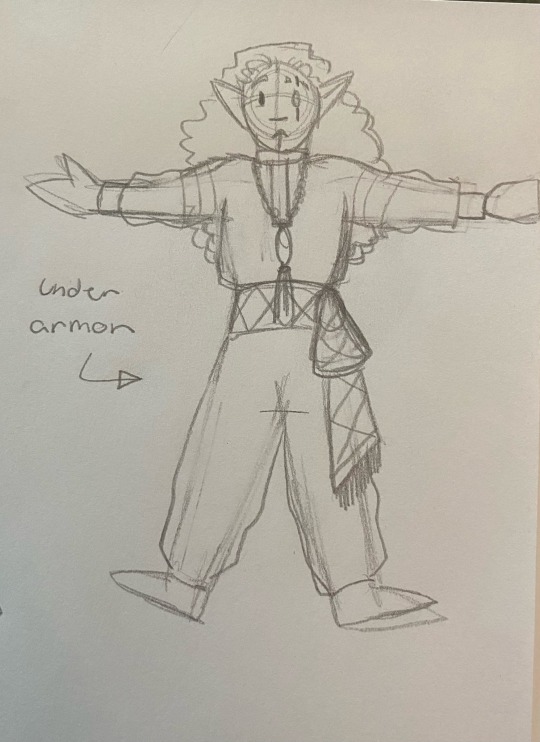
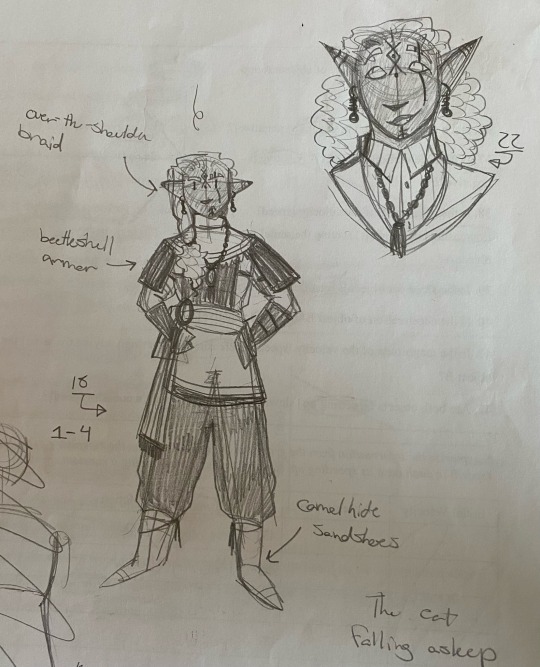
As I’ve mentioned before, this design is inspired by Ukrainian, Bulgarian, and Middle Eastern clothing.
The neck piece is a Lemko seed bead necklace
The face paint is inspired by Croatian hand tattoos and North African face tattoos- they serve as blessings, and different symbols mean different things. The line down his chin is standard (almost all elves wake up in the morning, say their prayer and draw their chin line), a blessing from Vrasuta the sun goddess, and the symbol on his forehead is a blessing of luck (most soldiers use this one)
The armor on the arms is inspired by middle age middle eastern armor- “beetle shell armor” very hard and matte armor plates that are both decorative and functional
The pants and shirt are inspired by vyshyvakna (as well as the sash)- If I could change one thing about this drawing, it would be to make the sash less ugly, and reverse the blue and white
The boots I saw only once on a drawing of a Bulgarian folk outfit (I apologize I do not remember what they are called) - but I think that they would be “sand boots”, very light and airy, yet it’s almost impossible for sand to get in
My AU takes place in a 1940s-1950’s setting, so I added a couple of more “modern” touches, like an army chest vest and some… I don’t know what to call them, leather bracers?
His signature weapons are two retractable Shashkas which channel his stone power. He was always sent on stealth missions, so long range weapons aren’t really his forte
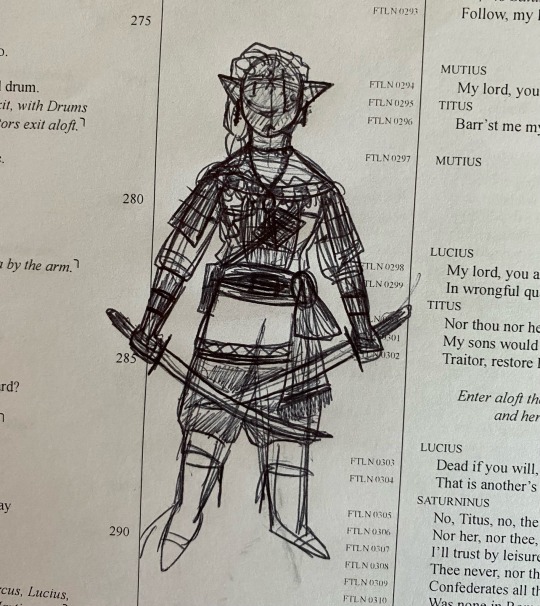
Throughout my sketches I write his name as Tręlis (tree-less), which is his name in my AU, but I’ll keep using his canon name in my posts so I don’t confuse anyone.
Part 2 will be his palace clothes which is a little less story centric and a lot more self indulgent because I just like dressing boys up in pretty outfits 💪
#the first time I posted this Tumblr flagged it at mature?#so uh… yeah idk why#amulet series#kazu kibuishi#prince trellis#amulet comic#cam’samuletrewrite
33 notes
·
View notes
Text
"As if Croatia and Serbia were competing, desperately wanting to match the level of vulgarity, hateful war-mongering and fascist inclinations of the other side, both sides began spreading rumors, half-lies and panic among their people. Who was to blame for all the troubles? It was crucial to find a culprit. Just as the Albanians were seemingly the chosen guilty party for most Serbian troubles (according to the Serbian media), in Croatia citizens of Serbian descent were quickly singled out as the main historical wrongdoers never to be trusted (according to the Croatian media).
The very fact that someone’s mother happened to be of Serbian ethnicity made that someone automatically suspicious. The second most hated group became the Yugoslav National Army, which the Croatian media portrayed as sympathetic to the Serbian cause (which would soon prove to be tragically true). Suddenly, the families of Yugoslav National Army officials became targets too. In shock, Goran and I realized that his family fulfilled both criteria for being suspicious: a) they were Serbs (since when? I was clueless, as usual) and b) Goran’s father used to be a military officer. I myself had a Serbian biological grandmother. (Would the fact that she had abandoned my mother at birth be an exonerating fact, I asked myself. Does nationalistic blood counting even care for details like this? And what about Jewishness? Was my mother right in advising me not to talk about it?)
I noticed that my Croatian friends and colleagues began speaking to me in a slightly changed tone. So did my Serbian friends. Over and over, I would hear the same exact sentence, spoken with a different accent: “You don’t understand this. You’re not from here.” In Croatia: “You don’t have a right to say anything. You’re not a pure Croat.” Pure? In Serbia: “What do you know about this? You’re not Serbian.” The same verdict would come out in myriad different versions: you don’t belong, you’re not “one of us,” you don’t have the right, you don’t understand, you don’t care about “us,” which side are you on anyway, what are you doing with “them,” why don’t you stay here where you belong, why don’t you go back to where you belong…? The noise was deafening. My mind was boiling.
One thing was clear: I was no longer trusted, in either of the two opposing camps, not even by my friends and colleagues. One of the most effective tactics in the production of hatred is abolishing all contact between opposing sides. This was exactly what both sides were frantically trying to achieve. You could not buy the papers from the other side anymore. You could not listen to the radio from the other side anymore. You could not catch TV programs from the other side anymore. The simple fact of my traveling between the two antagonistic cities was a subversion of the crucial idea of disrupted communication. Very often, in conversations on both sides, I would find myself screaming at the top of my lungs, trying to explain, explain, explain. But nobody was listening anymore.
The other technique in the production of war, an enterprise that was developing daily in front of our eyes, was the rehashing of old World War II wounds on both sides. More and more, the Serbian media began using the word “Ustaše” (the Croatian WWII fascists) to depict the whole Croatian people. The Croatian media, in turn, began using the word “Četnici” (the Serbian WWII monarchists who eventually sided with Hitler) to talk about the Serbian people. What was planted in the media at the time would later become reality. It would become a clear case of self-fulfilling prophecy. The old foes “Ustaše” and “Četnici” would soon rise and take up arms again. Sometimes it would literally be the same arms and the same uniforms that had been hidden away in dusty cellars since 1945.
In Serbia, Milošević, although nominally a Communist, aligned himself tightly with the Serbian Orthodox church. In horror, we were watching processions of Christian Orthodox priests carrying the bones of some important Serbian saint, on national television. The bones of Serbian civilians killed by the Croatian Ustashas during WWII were being diligently dug up from their long-forgotten graves. What was exactly the same on both sides was a harsh and merciless anti-Communism. And a newly discovered religious fever. What was most shocking, on both sides you could feel a deep, intense hatred for the land we had all been taught to love and cherish since our births, our shared country – Yugoslavia. Suddenly, the former loudest, flag-waving Yugoslav patriots became its main vilifiers.
And on both sides, WWII history was being frantically rewritten, picturing the winning anti-Fascists as the bad guys and their foes, the homegrown Fascists, as the good guys. What was inconceivable to me was the absolute readiness of people on both sides to accept the new “truths,” as if they had silently always believed them. The loudest, most enthusiastic revisionists proved to be the former members of the Communist Party. Old uniforms were being quickly replaced by new ones, both physically and metaphorically. As the world around us was crumbling down, my father’s take on things became especially valuable. He knew his history and his politics well. He was an active participant in, and a firsthand witness to a history that was repeating itself before our eyes."
- Mira Furlan, Love Me More Than Anything In the World
18 notes
·
View notes
Text
professional help, c14. Antamoro.

simon riley x original character.
trigger warnings: violence, sexual assault, mentions of rape, trauma, sexual themes, swearing, use of alcohol and drugs.
song to listen to when reading this: Piazza Grande, Lucio Dalla, Francesco de Gregori.
abstract: hey it's Jude, if you don't like being lied to don't read this because I'm seriously full of shit and these lies will probably bite me in the ass at some point. anyway, spoiler alert, kinda dark ending, but that's what you get having me tell this story. bye.
'You're from Italy?'
'Not exactly', she lied. Put your head in the game, no more information for him. Stay true to your profile. They were walking near a park, she was holding Jinx on a leash. The air was crisp, it wan't windy and the dog was overly excited. She had quickly ran upstairs to leave her bag at her place, put on a scarf and take the dog. When she had gone down the stairs, Simon was waiting for her on the sidewalk. She smiled at him involuntarily, seeing Jinx run towards him to smell his shoes and legs, tail wagging. He slightly bend down to let him sniff his hand. They had been walking in silence for a while, his hands in his pockets, her struggling to keep Jinx from pulling on the leash. He guessed right, she was from Italy. The hand gestures maybe or her fake name, which was Italian. She could't tell him the truth he already knew too much and he was smart enough to come up with the right questions. Thankfully, she was quite good at lying on the spot. 'I was born in Southampton, my dad is from Italy' she said. She was walking a lot slower, Jinx sniffing the grass. 'I heard you speak Italian, though', he noted and she cursed him for being so attentive to details. 'I wouldn't say English is my first language, I only spoke it at school… my mom is Croatian, she met my dad in Italy so I spoke Italian my whole life. I also went to uni in Italy…' she lied. 'What did you study?' he asked. He did have a few questions, some of them less appropriate than others. 'Psychology' she replied, that wasn't a lie. Not a total lie anyway. He wanted to know her life story and he was about to ask her to just tell him about it from her first memories of childhood, but she spoke first. 'I forgot your surname' she said, he told her. 'What's yours?'
'Antamoro.'
He swore that was some kind of witch magic shit, cause he never heard something that sounded like that. Her voice was different when she said it, it was low. She rolled the r on her tongue. Antamoro. It sounded like fucking royalty. It sounded rich and pure, it sounded red and thick like blood. He tried to repeat it in his British accent, and she giggled at the attempt. That made her say it again. Antamoro. It means antidote in Greek. That was his final straw. He was hypnotised. Alba Antamoro. He was thinking about getting it tattooed on his forehead, when she spoke again. 'Why did you join the military?' she asked, and he told her. Some bullshit about serving the country, making a difference. He was young when he joined, he had so much rage. Fighting was all he knew how to do, and he became quite good at it. He even grew to like the paper work, it relaxed him. She sat down on a bench, crossing her legs. He sat beside her while Jinx sniffed and ran around them. Fog had started to set around them. Did she always go to that spooky park? She got a pack of cigarettes out of her pocket. Winston Blue. She took one out and signalled for him to take one as well. He wanted to deny, he felt like he was giving into her. He was letting his guard down. He accepted the cigarette and she noticed he took so long to decide. She chucked and lit her cig. 'How did you end up here?' he finally asked. She wasn't asking him questions about himself, he was the weak one in the situation. He wanted to know her, he was showing interest. So, why the army, why America? She breathed out smoke slowly. 'I took two separate masters degree in clinical psychotherapy and forensic psychology. Both in the UK. Then I came here to get my licence and work cause I didn't want to be in England anymore. That's it' she said, like it was an easy job. Three university degrees, hu? You're smart, Alba, I knew you were smart, he thought. That's how she knew so much and her brain worked so well…She lived all over the place, she must have saw places, visited countries, talked to people, experienced a life he never lived. He thought her parents must have been wealthy, which they were. Alba didn't mention she stole from them to pay her education and had serious debt before she could fully pay it off. Didn't mentioned she worked at Lidl and as a part time waitress for two, miserable years… He looked at her smoke, he rolled up his mask and lit his cigarette. She was calling Jinx who had a stick in his mouth and was running around with it, 'Put it down…' she was saying.
'I thought you were too young to be a therapist' he said, she turned around to face him with a surprised expression. 'How old you think I am?' she asked, her voice bright and chirpy. '24…3..?' he guessed. She chucked, 'I'll take it was a compliment… I'm 26 Simon, how old are you?' She asked back and he told her he was 32. She stubbed her finished cigarette on the side of the bench and placed it beside her foot, she did not throw it on the ground. 'Your family still in Southampton?' he asked when they stood up and she got the dog back on leash. She waited a tad too much to answer. My family is not in Southampton, my family is in Italy and I haven't talked to them in a very long time, because they do bad things for a living. I left because I didn't want to be associated with them anymore and I'm dead to them now. I left and I risked my life and I can never go back, I changed my name, I have a new life and I will never see my home country again. I will never see my mom again, I will never see my dad again, my sister. I've been fucking alone for seven years. I lived alone, I studied alone, there was no one at my graduation, there was no one at Christmas, for New Years, for my birthdays. I ate alone for seven years, I slept in an empty house, sometimes I went weeks without speaking to anyone. I don't have a home, I don't have anyone to hold me when I cry, to be proud of me, to have dinner with me, to take a walk with me. I am a ghost, I am nobody.
'Yes they still live there.'
He walked her home. She asked him more questions, like where he was from. Near Manchester. If his family still lived there. They passed, to that she replied I'm sorry. All of them? He asked her what she was doing with the ballet school, he remembered she talked about choreographies with Gemma in the car. The Nutcracker. She asked how long he had worked for Price, if he liked his job, which he did. She asked him about the mask, she was specific, Do you wear it even when you go in public? Honey I don't go out often. He didn't say that. 'I like it better when I wear it… even in public.' They were in front of her place. She had this big black scarf on, her oversized jumper which was swallowing her figure. Tiny running shoes. She looked tired. In a good way, relaxed. 'Thanks for the walk' she said. 'No problem.' They had spent a good two hours together… who would have thought. He thought that was his cue to leave but she spoke again. 'Thanks for listening to the crater story. I'm not expecting you to do anything, tell Price or whatever. You're right, it could be a coincidence, I don't think it's worth pursuing.' She sounded sincere. He offered her a small smile that she couldn't see because of the mask. 'Sure.'
'Goodnight Simon. Drive safe.' she said.
'Night Alba. Thanks for dinner'.
When he got back he ran into Johnny on the way to his room. 'Oi, where have you been, did you go out?'
When she got home, Salvo had replied to her message saying she had dinner with the Lieutenant. The message read: 'What the fuck??? call me???'
notes: if you ever lived abroad for a long time you know how it feels to know you don't belong anywhere. the loneliness. the silence. and at the same time, doing what you love, studying or working and feeling like you're achieving so much and all on your own. you came so far and the only person to thank is yourself. I want to tell you through Alba's story how it feels to get out of a small reality in a part of Italy that not very educationally oriented. being able to get away and discover what is actually like to live, to become an adult by yourself. the realisation that you've been doing it all alone is hard to manage.
notes: she thinks she's a Ghost (I love this, the invisible string). also I realised when I was proofreading that I wrote 'I had no one to have dinner with me, to take a walk with me' which she had just done with him… blushing.
notes: i fucking love the surname Antamoro, which I think it's from the Northern part of Italy (where Alba is definitely not from eheheh). also, the fact that it means antidote is fucking perfect to describe her relationship with Simon. btw, you pronounce it exactly how i't written, but you can check google translate.
taglist:
@ghostlythots @sweetfemmefatal @natxpat @chavarriakeren647 @ravenmoore14 @farther-than-pleiades @internallyscreamings @hwromi @atoxicrat @cuti3maddi3 @deafeningkittenblaze @its-celeste @serene-hills @lexidoll12 @poohkie90 @lunatiquess
@warmedbythebody @katzykat @iristhemuse @azkza @keiraslayz @abbyandermine @jennyjencakes @dest-nai @corset-briefs @nutze-kekse @ilytsukiw @b3anspr0ut
@pondsblog @missyouzoe @fallenkitten @bigauthorrascalturkey @bethtay @angelynn-nicole @starluv @stargirlisworld @giyuuslittleslut @impossiblecupcakelight
@rkrivees-blog @ghosts-hoe @kam1snotverysmart @gauky76 @freyjaaasstuff @spicyspicyliving @scottpilgrimvsmyfists @courtney0-0 @shinchanboi @darling006 @my-therapist-hates-me
#ghost cod#simon ghost riley#cod mw2#ghost fanfiction#cod x reader#call of duty#cod fic#cod modern warfare#simon ghost x reader#ghost headcanons#ghost simon riley#simon riley x reader#simon riley x you#simon riley call of duty#ghost mw2#ghost#cod 141#task force 141#141 x reader#cod#soapgaz#johnny soap mactavish#captain price#cod mw3#cod mwii#modern warfare#call of duty modern warfare 2#call of duty modern warfare
14 notes
·
View notes
Text
List of Direct Pop Culture References in Season 1 of Jujutsu Kaisen
I kept trying to find a comprehensive list somewhere but couldn't. So, here's one for me.
Ninja Warrior and Mirko Cro Crop (Ep1)

Sasuke, or Ninja Warrior as it's known as in multiple incarnations, is a sports reality show in which competitors attempt to complete a four-stage obstacle course.
youtube
Mirko Cro Crop is the ring name of Croatian mixed martial artist and kickboxer Mirko Filipović. And yes, Sasaki-senpai does clarify that Mirko's not dead.
Jennifer Lawrence (Ep2)
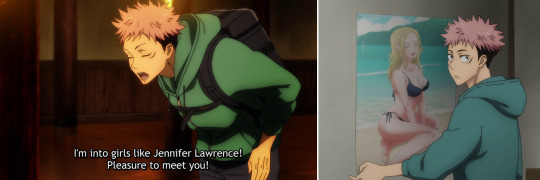
This one is possibly the most infamous reference in JJK actually. Of course, Yuuji is referring to American actress, Jennifer Lawrence. Gege Akutami said in the fanbook Yuuji became her fan after seeing Silver Linings Playbook (2012).
youtube
Super Smash Bros. (Ep5)

When the second years first ask Nobara and Megumi to participate in the Kyoto School Goodwill Exchange Event, Nobara's first thought is a Smash Bros. tournament. She'll use Meteor Smash so you can't get back up. All the better if it's the Wii version.

Onita (Ep6)

When Yuuji first starts lamenting his lack of ability to use a Curse Technique, Gojo cuts in that Yuuji can use a power bomb. Because it's something Japanese wrestler Atsushi Onita (who is not a sorcerer as far as we know) can do anyway.

Shonen power techniques (Ep6 cont.)
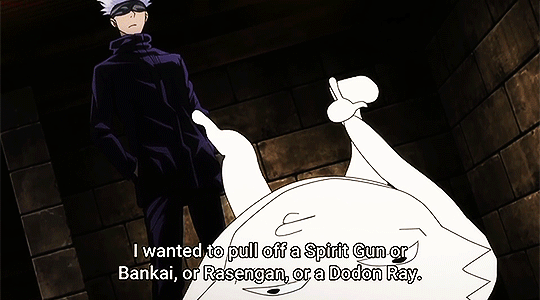
Yuuji then proceeds to list several other abilities from other shonen series. The Spirit Gun from Yu Yu Hakusho, Bankai from Bleach, and Dodon Ray and Kamehameha from Dragon Ball.


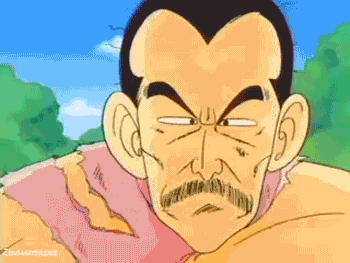
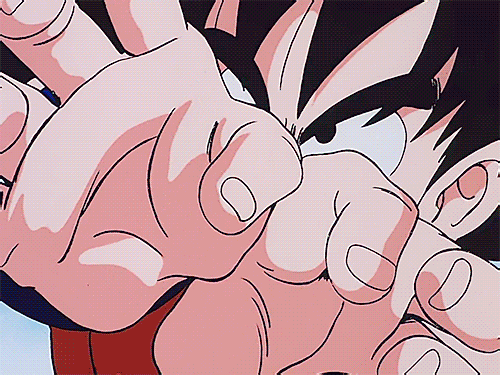
Lord of the Rings (Ep7)

For his training on controlling Cursed Energy, Yuuji is made to watch a variety of movies. For the adaptation, the animators interpreted the cry for Sam as a scene from Lord of the Rings: The Fellowship of the Ring (2001).
youtube
Actually, in the manga, Akutami was referencing I Am Legend (2007). The movie stars Will Smith and his only companion, a dog named Sam, in the middle of a zombie apocalypse. Uh, things don't go well for the dog.

Gojo's other movies (Ch13)
Additionally, there were a few specific movies Akutami had in mind that wasn't carried over to the anime. (Though, honestly, some of these DVD covers in the anime look so familiar and detailed I suspect they are references to other movies. If anyone can identify any of them lmk!)
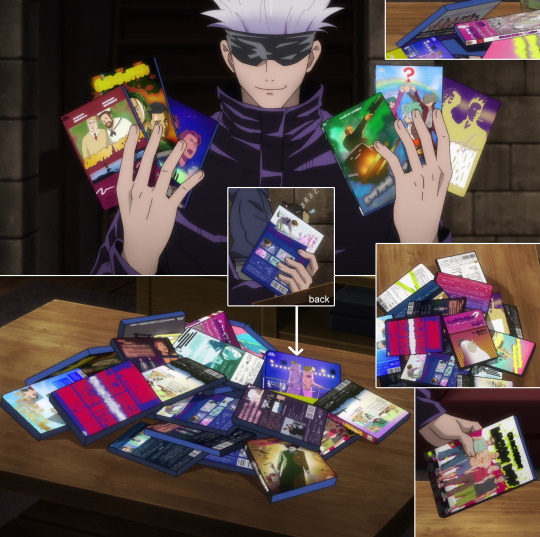
Anyway, here are the ones we know of in the manga!
Léon: The Professional (1994), The Descent (2005), The Host (2006), The Emperor's Naked Army Marches On (1967). And the movie that Gojo spoils about the super annoying heroine who dies spectacularly at the end is Deep Blue Sea (1999). And yes, if you squint and zoom you can see which dvd has the cover for what movie.
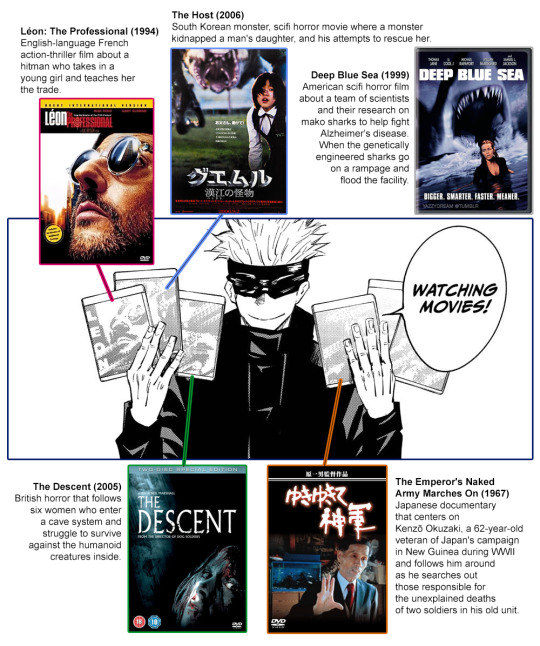
Oikawa Tōru (Ep9)
A blink and you'll miss it stand-in of someone that suspiciously looks like Oikawa Tōru from Haikyuu!!

Castaway (Ep11)

Yuuji makes Junpei laugh when the former unexpectedly recreates the scene from Cast Away (2000) when Tom Hanks' character loses his illusory best friend...

youtube
Neon Genesis Evangelion (Ep11, Juju Stroll)
youtube
This entire Juju Stroll is a parody of Neon Genesis Evangelion episode previews. With shots that are reminiscent of NGE and a dramatic and frantic voiceover. The standout shot to me was the one of Yaga sitting with his hands folded in front of him in classic Gendo Ikari fashion. They even had Yaga sitting over a burning camp stove just so they could get the orange glow reflecting off his glasses. Ha!

Luncheon on the Grass
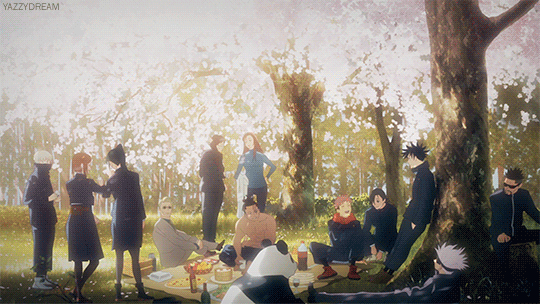
The full convergence of all the characters was completed by episode 13 in the first opening. The idyllic scene is based off of Luncheon on the Grass (aka Le Déjeuner sur l'herbe) by Claude Monet. I like how Panda is in place of the dog.

I wonder if Todo being half naked here is further reference to the more scandalous, The Luncheon on the Grass, by Édouard Manet which is what Monet's own painting is a direct take on. (That painting depicts a nude woman sitting with two fully dressed gentlemen.) ...Or it could just be Todo being Todo.
Ichiro?! (Ep15)

Utahime, incensed, tells Gojo to respect his senpai! I'm a bit hesitant about this one, but it may be a reference to Ichiro Suzuki jokingly complaining about not being respected as a senpai during the 2009 World Baseball Classic celebration. Baseball is HUGE in Japan, and the celebration looks wild. It may be iconic enough that it can be casually mentioned and most Japanese would know what Yuuji was talking about. Also, considering the Jujutsu Koshien episode about to come up, it may've been foreshadowing. (Found here)
youtube
Sebastian Stan (Ep15, Juju Stroll)
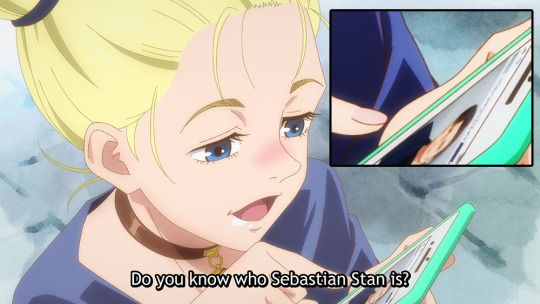
Another famous American celebrity! When asked about her type in episode 15's Juju Stroll, Momo was drooling over a picture of Sebastian Stan. Stan is most well known for playing the Winter Soldier/Bucky Barnes in the MCU. I wonder why her answer didn't pass muster with Todo. Maybe she hadn't had the chance?
Pepper (Ep16)

Nobara, smack-talking to Momo, says the Kyoto school have their own "Pepper-kun" that she should turn into scrap. Mechamaru immediately knew she was referring to himself. 😆 Pepper is the semi-humanoid robot that SoftBank introduced at a conference in 2014.

Great Teacher Gojo (Ep18)
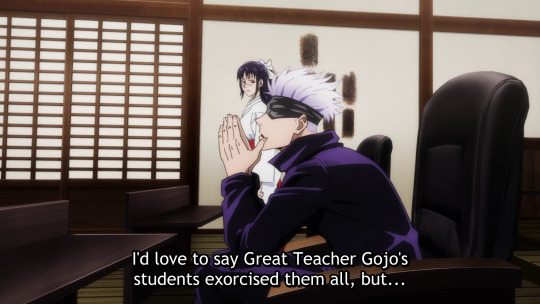
Great Teacher Onizuka, aka GTO, is a classic series about a former biker gang member becoming the best teacher to a class of problem children.
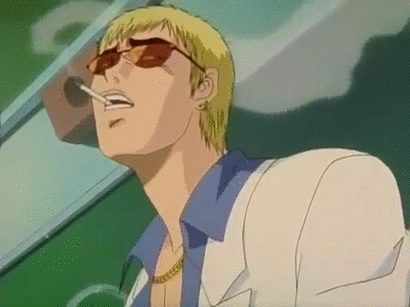
Boogie Woogie
Boogie-woogie is a genre of music, but Todo's Cursed Technique, "Boogie Woogie" is specifically a reference to boxer, Muhammad Ali, who was recorded playing boogie-woogie on camera. (Which ties into an even more extensive reference regarding his mentor. But I won't spoil it here for anime-onlys.) I dare say, Todo's attitude may be a bit Ali inspired too. Haha
youtube
Ma-kun of Tohoku (Ep21)

When up to bat during Jujutsu Koshien, Nobara says people call her "the Ma-kun of Tohoku" which... doesn't make sense, since Masahiro Tanaka (affectionately called "Ma-kun" by fans) is already a baseball player for the Tohoku Rakuten Golden Eagles. 😂
Additional trivia: JJK did a collab with the Rakuten Eagles in September of 2022.
Game of Life (Ep24)

And finally, we end the season with some of our villains playing The Game of Life board game. That spinner, colors, and design are pretty unmistakable. Something extra I spotted is that Choso already managed to get married!
*Edit: Had to include this link to officially licensed JJK Game of Life.

Aaand that's everything, I think. But let me know if I missed anything!
*Edit 7/23:
Gojo Satoru's Go Go Gojo! (Ep6)
The Juju Stroll at the end of episode 6 references the Igo/Go game series Hikaru no Go. At the end of Hikaru no Go episodes were post-episode segments called "Umezawa Yukari's Go Go Igo!"
Props to r/sofastsomaybe for pointing this out, because like a fool, I dismissed the Go reference as a coincidence.
youtube
Anne Sullivan, Helen Keller, and Inoki (Ep15)
During Todo's nichijo fantasy of himself and Yuuji, Todo quotes, "What fool thinks of defeat before even trying?" Incorrectly attributing the quote to something teacher Anne Sullivan said to disability activist, Helen Keller. Todo is actually paraphrasing pro-wrestler, mixed martial artist, Antonio Inoki. Who said, "What kind of idiot thinks about losing before [the match]?" during a pre-match interview.
youtube
Seishun Amigo (Ep15)
At the end of that same daydream, with tears and snot streaming down his face, Todo says, "'In our hometown we were invincible,' huh." (地元じゃ負けしらず) Which are a part of lyrics from the popular song, "Seishun Amigo" (青春アミーゴ) by Shūji to Akira. "Seishun" means "youth" and "amigo" of course being the Spanish word for "friend."
Amusingly, I found this JJK fan cover video of the song. Lyrics translation included.
youtube
The two references above were found thanks to Aki Tanaka.
Continued in this reblog chain.
104 notes
·
View notes
Text

Croatian Soldiers hash out their next tactical team movement during a training exercise at Bemowo Piskie Training Area, Poland.
Photo by U.S. Army Sgt. Sarah Kirby (2018).
#army#military#armed forces#military life#infantry#army strong#troops#veteran#soldier#tactical#tactical gear#tacticool#training#exercise#Croatia#Poland#Bemowo#military 1st
33 notes
·
View notes
Text
youtube
#youtube#militarytraining#International cooperation#Croatian soldiers#NATO#Polish soldiers#Tactical maneuvers#Military technology#War games#Missile defense#Military training#Air defense systems.#Army training#Defense#Military drills#Air defense#Live fire exercise#American soldiers#Military exercise#Anti-air missiles#Armed forces#Soldier training
0 notes